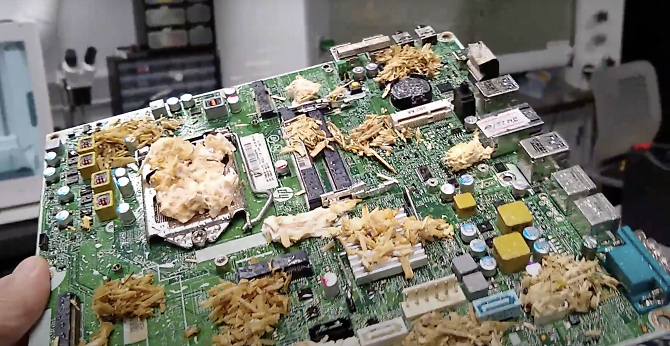Fungi are a kingdom of organisms that have a wide range of applications in human activities. Without them, antibiotics would likely not have been discovered, and the food industry would be poorer for its wide variety of confectionery, bakery, and alcohol products. However, people invent more ambitious applications for them. No one can deny the ambition of scientists trying to build a computer out of mushrooms.
Fungi are another example after organelles that so-called wet programs can play an important role in the future of computers.
Artificial intelligence will not conquer the world. According to scientists, organics have much more potential
Wetware is a term mostly associated with science fiction fans. It obscures the concept of individual cells, organs, or entire organisms as biological equivalents of hardware and software. A definition understood in this way includes, for example, the project of using organelles to create a biocomputer, which was recently described in PurePC. However, human brain cells are not the only idea for using bio-based materials as an alternative to silicone. At the University of the West of England in Bristol, there is a laboratory for unconventional computing, where research is carried out on the possibility of using mushrooms as conductors.
Amoebas in the biocomputer. They solved the traveling salesman problem
The mycelium, which is the “body” of the fungus, is made up of thread-like structures called hyphae. It may consist of one or more cells. As it turned out, they can act as conductors of electrical impulses and are also able to store information. The undoubted advantages are also the ability to regenerate and reconfigure, which in theory would allow you to change the application of such wet software in a simple way. Mushroom-based systems are also characterized by low energy consumption. The disadvantage is their computational capabilities, which are much lower than conventional computers.
Successful communication between rat neurons and synthetic cells
Andrew Adamatsky, director of the Extraordinary Lab, started by introducing fungal cultures into biomass in the form of hemp or wood chips. The resulting structure was then stimulated with electrodes and the electrical activity of the fungus measured. The results showed that in the case of mushrooms, there is an oscillation of the signal generated in response to a stimulus through an external stimulus. On this basis, it was concluded that it would be possible to process different logical functions due to the different geometries of the mushrooms. The transmitted electrons allow it to map logic gates based on the received electrical pulses. In theory, it would be possible to create a larger device capable of converting such signals more effectively, but as Adamatsky himself pointed out, the current research is in an early stage of development. This means that mushroom biocomputers will not soon leave the realm of fantasy and turn into reality.
Source: Popular Science, Andrew Adamatzky

Echo Richards embodies a personality that is a delightful contradiction: a humble musicaholic who never brags about her expansive knowledge of both classic and contemporary tunes. Infuriatingly modest, one would never know from a mere conversation how deeply entrenched she is in the world of music. This passion seamlessly translates into her problem-solving skills, with Echo often drawing inspiration from melodies and rhythms. A voracious reader, she dives deep into literature, using stories to influence her own hardcore writing. Her spirited advocacy for alcohol isn’t about mere indulgence, but about celebrating life’s poignant moments.



![A computer made from mushrooms may be an alternative to organics, but it is unlikely to ever replace silicon [2]](https://www.purepc.pl/image/news/2023/03/07_komputer_z_grzybow_moze_byc_alternatywa_dla_organoidow_ale_krzemu_raczej_nie_wyprze_1.jpg)
![A computer made from mushrooms may be an alternative to organics, but it is unlikely to ever replace silicon [3]](https://www.purepc.pl/image/news/2023/03/07_komputer_z_grzybow_moze_byc_alternatywa_dla_organoidow_ale_krzemu_raczej_nie_wyprze_2.jpg)
![An unusual phenomenon on the sun. A cosmic “snake” flew through the atmosphere [WIDEO] An unusual phenomenon on the sun. A cosmic “snake” flew through the atmosphere [WIDEO]](https://www.moviesonline.ca/wp-content/uploads/2022/11/An-unusual-phenomenon-on-the-sun-A-cosmic-snake-flew.jpg)


